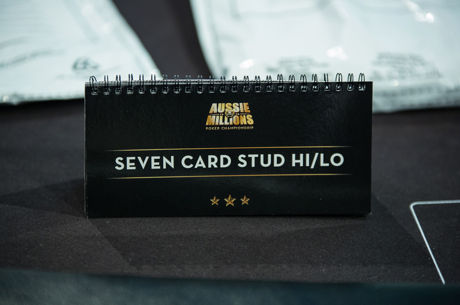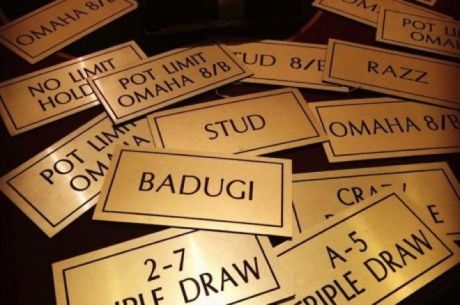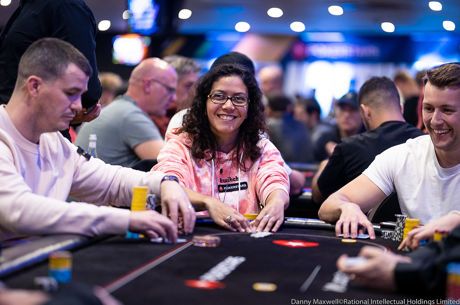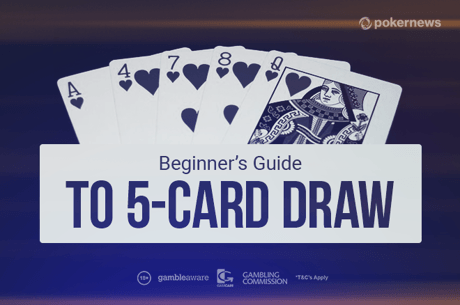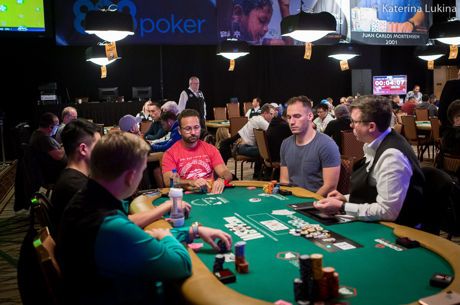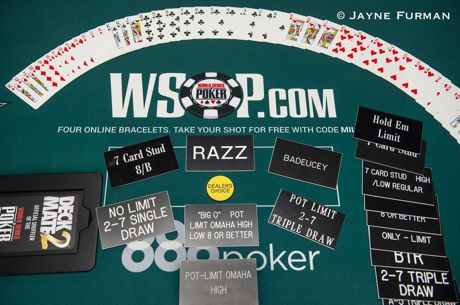Tips for the Razz Round When Playing H.O.R.S.E. and Other Mixed Games
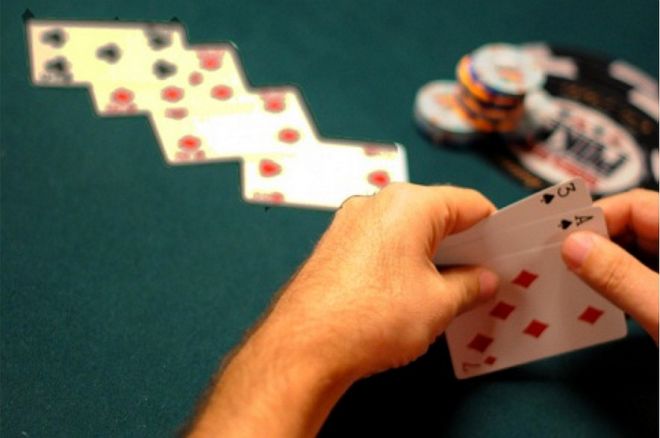
I don't recall the exact date I last saw a straight razz game spread in a poker room, but it was more than 20 years ago. Even so, I've played razz many times since then, but only as part of a mixed game such as in H.O.R.S.E. or other rotations. It's in that context, then, that I'd like to give you some tips for playing the great game of razz.
This brief article does not attempt to be a comprehensive primer on the game of razz. For that you should pick up a copy of David Sklansky's Sklansky on Poker or read the brief razz section in Doyle Brunson's Super/System. Instead, I just want to give you one overriding thought and several other subsidiary thoughts to guide your game of razz when you encounter it in the typical H.O.R.S.E. cash game or tournament:
Take advantage of the fact that the vast majority of your opponents will have very little experience playing razz. But understand also they are not likely to be rank beginners at the other games.
True, some of your opponents may play razz online, and some may even have a lot of experience with the game. But the vast majority of players never or only rarely play razz. They may have read a book to learn some general guidelines, but they will be much, much more familiar with the flop games than the stud games �� and among the stud games, they will be the least familiar with the game that is spread the least today, razz.
This inexperience will produce a style of play that is quite different from that of inexperienced poker players in general. Most inexperienced players, coming to a casino to play, will tend to play too loosely. In the old days, back when razz and stud were spread more frequently in casinos, a new player to the game would make the mistake of not playing tightly enough. They were not terribly sophisticated in the ways of casino poker and could be exploited just by playing a level or two more tightly than they were.
But in the typical mixed game today, those who sit down generally have at least a fair amount of experience with poker in general, and flop games in particular. A new player to the game of casino poker is unlikely to pick a H.O.R.S.E. game for a first experience. Rather, those who sit down in mixed games tend to be at least slightly more sophisticated players �� that is, they are playing razz with the perspective of at least being fairly good at hold'em, and perhaps good as well at Omaha, stud, or stud hi-low. Accordingly, they make exploitable errors that are not in keeping with the typical errors of "newbie" casino poker players.
What are the exploitable errors in razz of the typical H.O.R.S.E. player?
I have found that H.O.R.S.E. players generally approach razz as a round to survive until they can get to one of the other games in which they are better skilled. This survival mentality, perhaps augmented with a little bit of book learning about playable starting hands in razz, lends itself to a relatively mechanical style of play �� a style that is highly exploitable.
Accordingly, I have observed that the typical H.O.R.S.E. player tends to follow the general style of play as indicated in the list of tendencies shared below, and for each of these tendencies, I will give you one or two ways you can exploit it to your advantage. Keep in mind, of course, that among the typical players will be players who are atypically skilled at razz and who will not follow these general standards of play. Against them, my advice is to avoid confrontations until you have mastered the game (and for help with that, see the first paragraph about learning a more complete strategy).
Here are those tendencies of the typical H.O.R.S.E. player during the razz round, along with how to exploit each:
They will play tightly.
- Play your scary boards aggressively if they have not already entered the pot for a bet. If they have already entered the hand with a call, try to isolate them so you can steal the pot from them on a later round.
They will overvalue starting hands containing three cards 8 and under.
- Being familiar with the other hi-low, 8-or-better games, they will think that an 8-low razz hand is what they're shooting for, not really understanding the importance of live cards and the hands others are likely to have. Be willing to play aggressively against them with a worse board but a better draw with live hands like (Ax2x) 9x4x versus (XxXx) 8x7x. They will likely call you down to seventh street when they make their rough 8, and lose when you make a better hand.
They will want to wait for hold'em and Omaha hi-low to make money.
- Watch for players who are almost on auto-fold during the razz round (and other stud rounds), just waiting for the other games to return. Bluff them mercilessly with scary boards.
They will be more likely to respect your raises.
- Not having a good grasp on razz strategy, they will not understand how they should sometimes call or raise your raise when they are behind. Reraise them to drive them out of the hand, even when you suspect they might be ahead or have a much better draw, especially in the first two rounds (third and fourth street) when the bet size is small.
They will avoid confrontations unless they have an obvious advantage.
- They don't want to lose money during their weakest game. Once again, push them around with your scary boards.
They will be less likely to make moves on you.
- Respect their bets, raises, and reraises. Not understanding much strategy, their aggression is highly likely to indicate great strength.
In sum, you generally want to play aggressively to steal hands and isolate these players who will play too tightly and timidly.
Other Tips When Playing the Razz Round in Mixed Games
There are other rules of thumb will help you during the razz round when you don't understand fully or precisely what the best action in every situation is. Here are some of those to consider when playing razz in a H.O.R.S.E. game:
Your opponent's board is critically important in razz.
- In razz, unlike in stud or stud hi-low (and all flop and draw games, for that matter), there are no monster hands that are well-hidden. There is no equivalent in razz to a seemingly weak exposed deuce being a powerful trip deuces (as in stud). When you see paint in the first three cards, you know your opponent is weak. When an opponent is dealt a face card on fourth street you know he can't secretly have improved �� it hurt his hand.
Knowing the low cards that are out, especially those you need to improve, is extremely important.
- Hands that are otherwise strong become unplayable if the cards you need to make a strong low are out. For example, if you hold (Ax7x) 6x and the upcards around the table are Qx, Kx, 3x, 2x, 8x, 5x, and Qx, and there is a lot of aggression from those showing low cards, you should probably fold, because many of the cards you need to make your hand are already out. On the other hand, if you look around the table and see Qx, Kx, Ax, 6x, 6x, Jx, and 5x, you should surely call and you might even raise depending on how strong you thought the raiser.
If you catch bad on fourth street and your opponent catches good and bets, you should generally fold.
- True, he may be just playing his board against you, and have bricks in the hole. But in general, unless the pot is very large on third street, your best course of action is to give him credit, fold, and wait for a better opportunity to play back at him.
Against good, strong, and otherwise tricky opponents, tend to fold all but the strongest holdings.
- True, you might be getting played. But since, admittedly, razz is not yet one of your best games, you are better off saving your bullets for those players who play straightforwardly, whom you can read well, and who can't consistently outplay you on later streets. Figure out who those good players are and avoid them with all but the strongest hands.
Ashley Adams has been playing poker for 50 years and writing about it since 2000. He is the author of hundreds of articles and two books, Winning 7-Card Stud (Kensington 2003) and Winning No-Limit Hold��em (Lighthouse 2012). He is also the host of poker radio show House of Cards. See www.houseofcardsradio.com for broadcast times, stations, and podcasts.
Want to stay atop all the latest in the poker world? If so, make sure to get PokerNews updates on your social media outlets. Follow us on Twitter and find us on both Facebook and Google+!

